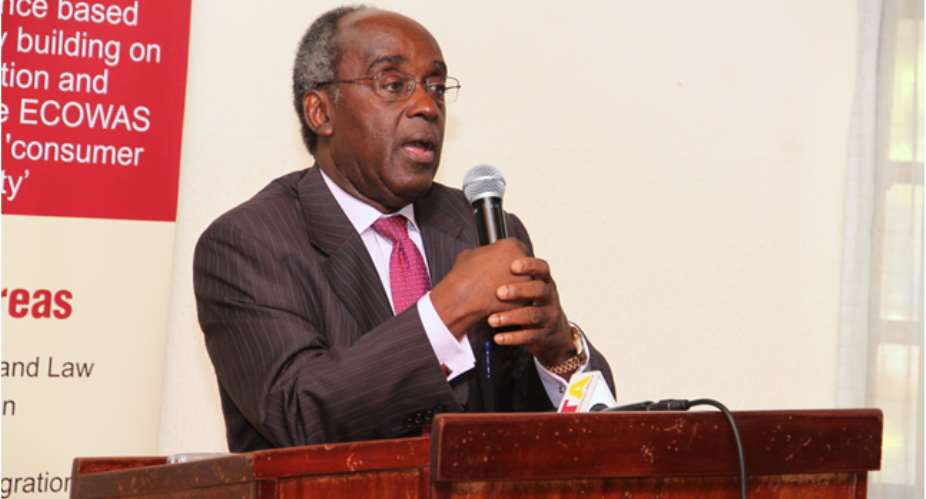“Like all market economies, the Ghanaian economy needs competition law and policy to ensure a proper functioning of the market in the interest of consumers and producers. It is thus of legitimate public policy interest to ascertain the health of competition law and policy in Ghana and West Africa, at both the national and sub-regional levels including the interactions between the national and regional policy process on this issue,” said Justice Samuel Kofi Date-Bah, Board Chair of CUTS.
Justice Samuel Kofi Date-Bah was speaking at a Capacity Building Workshop for High Court and Appeal Court Judges in Accra, Ghana. He emphasised the importance of a Competition law and Policy in Ghana’s development agenda. He added that the Protection against Unfair Competition Act 2000 (Act 589) does not regulate anti-competitive behaviour that generate a significant social cost, including loss of efficiency and innovation in the economy as well as higher prices passed onto consumers, hence the urgent need for a more comprehensive competition law.
The facilitator for the workshop Pradeep S. Mehta, the Secretary General for CUTS International said as a key ingredient for an inclusive growth, Ghana requires a robust competition law to regulate the market to ensure a win-win for both consumers and producers in the country. Competition in the market would result in easing market entry and exit, promote innovation and increased investment possibilities for the Ghanaian economy.
Mr. Pradeep Mehta said competition is not an automatic process and it needs to be nurtured. It is essential for government to put in place a functional competition policy and law. Competition policy, refers to government’s commitment to promote competition across all the sectors of the economy, while Competition Law seeks to curb anti-competitive practices and enforce the competition in the market.
In illustrating the benefits of competition, Mr. Mehta said the consumers and producers benefit from when competition is present in a sector. He praised the competitive nature of the telecommunication sector. He illustrated how competition and liberalization in the telecom sector has reduced the cost of making phone calls in the country and created jobs for many people.
He said though Ghana is yet to have a Competition Law in place, but it was important for judges and justices to be abreast with an emerging discipline in Law. He emphasized the important role that the judiciary plays in the promotion of competition in developing countries.
Justice Dennis Adjei, the Director, Judicial Training Centre and an Appeal Court Judge on his part said competition law is an important dimension to Ghana’s socio-economic development agenda, and the fact that policy makers have realized this gap in itself is an indicative of the innumerable benefits that such a regime would bring to both consumers and producers.
Mr. Vincent Emmanuel, Partner at Kulendi@Law in his closing remarks lauded CUTS for taking the initiative to organize the workshop for the members of the judiciary. He reiterated the need for a competition law in the country and most importantly, the need to adequately train judges who would ultimately be interpreting the Law when it becomes operational.
Mr. Appiah Kusi Adomako, the Centre Coordinator for CUTS in his closing remarks stated that an enactment of a National Competition Law will infuse a ‘level playing field’ in key markets and enhance the predictability and certainty in markets, thereby stimulating entrepreneurship and economic growth. He added that CUTS would be interested in becoming a knowledge partner with the Judiciary when it comes to Competition Law.
The workshop which took place at the Judicial Training Institute was well attended by judges from High Court and Appeal Courts from Ghana’s judicial service. The event took place under the aegis of the CREW Project with support from the DFID and GIZ.
The CREW Project is being implemented in four countries namely, Ghana, Zambia, India and the Philippines with the focal research sectors being the staple food and the bus transport sector. The CREW Project aims to develop an approach, which will help in assessing the benefits of competition reforms on consumers and producers in these two sectors.
 Pradeep S Mehta, Secretary General for CUTS International (the facilitator for the workshop)
Pradeep S Mehta, Secretary General for CUTS International (the facilitator for the workshop)





 Akufo-Addo commissions Phase II of Kaleo solar power plant
Akufo-Addo commissions Phase II of Kaleo solar power plant
 NDC panics over Bawumia’s visit to Pope Francis
NDC panics over Bawumia’s visit to Pope Francis
 EC blasts Mahama over “false” claims on recruitment of Returning Officers
EC blasts Mahama over “false” claims on recruitment of Returning Officers
 Lands Minister gives ultimatum to Future Global Resources to revamp Prestea/Bogo...
Lands Minister gives ultimatum to Future Global Resources to revamp Prestea/Bogo...
 Wa Naa appeals to Akufo-Addo to audit state lands in Wa
Wa Naa appeals to Akufo-Addo to audit state lands in Wa
 Prof Opoku-Agyemang misunderstood Bawumia’s ‘driver mate’ analogy – Miracles Abo...
Prof Opoku-Agyemang misunderstood Bawumia’s ‘driver mate’ analogy – Miracles Abo...
 EU confident Ghana will not sign Anti-LGBTQI Bill
EU confident Ghana will not sign Anti-LGBTQI Bill
 Suspend implementation of Planting for Food and Jobs for 2024 - Stakeholders
Suspend implementation of Planting for Food and Jobs for 2024 - Stakeholders
 Tema West Municipal Assembly gets Ghana's First Female Aircraft Marshaller as ne...
Tema West Municipal Assembly gets Ghana's First Female Aircraft Marshaller as ne...
 Dumsor is affecting us double, release timetable – Disability Federation to ECG
Dumsor is affecting us double, release timetable – Disability Federation to ECG
